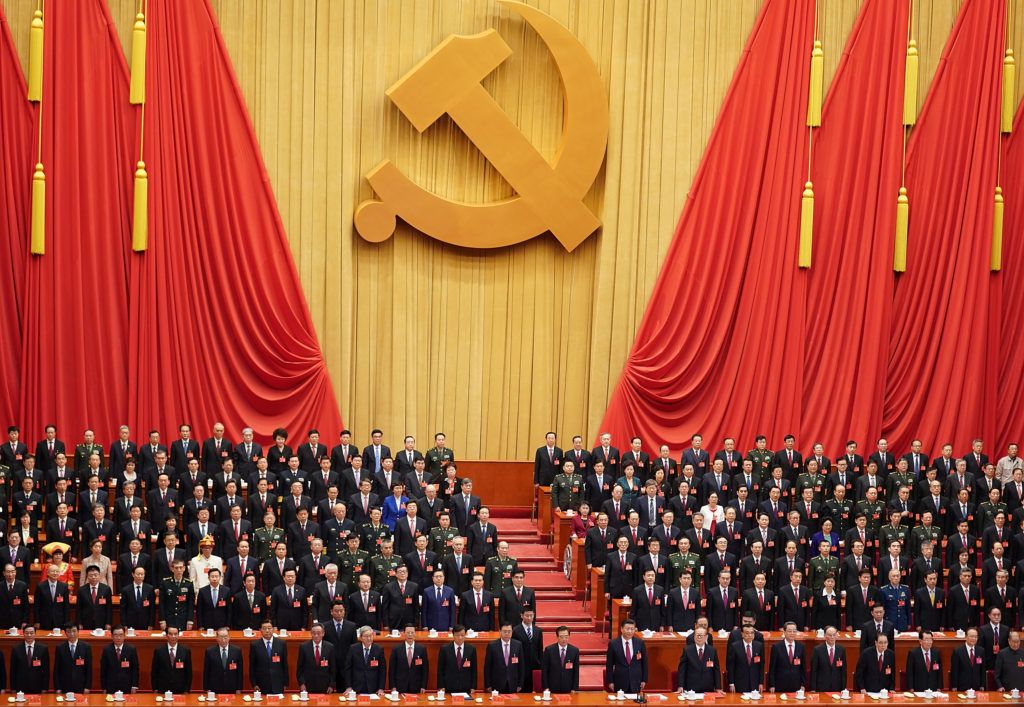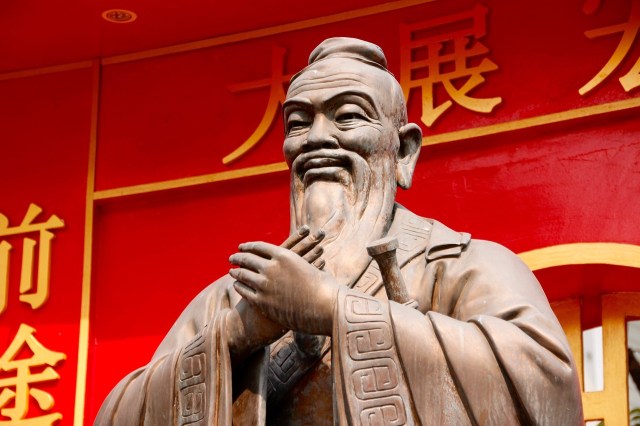
“Our greatest glory,” Confucius is reputed to have said, “is not in never falling, but in rising every time we fall.” He should know – the Chinese philosopher’s fortunes have soared and plummeted repeatedly over the past 1,500 years, much like the Middle Kingdom’s. For all he is viewed in the West as master of the gnomic Oriental aphorism, he spent much of the 20th century in the doghouse, accused by Mao of having supported a feudal structure that had suppressed the peasantry throughout history.
Today, Confucius is back in the officially authorised good books, to the extent that his name has been appropriated by the Chinese government’s international cultural outreach programme, the Confucius Institute (CI):
- There are now 516 such institutes in 142 countries;
- More than 1,000 ‘Confucius Classrooms’ in primary and secondary schools;
- There are 11 CIs in Britain, including at Edinburgh, Liverpool, Nottingham, Sheffield and Cardiff universities, and the London School of Economics.
It’s not hard to understand what’s behind that choice of name: in a world that remains suspicious of Beijing’s long-term intentions and short-term manpulations, and wary of its recent brutal history and modern-day authoritarianism, the great man’s brand is an unthreatening symbol of ancient wisdom and venerable cultural history.
The Chinese authorities insist the CI is a non-profit public institution that seeks only to promote and teach their language and culture in foreign countries – the equivalent of the British Council and similar organisations created by nations to advance their soft power. However, controversy around the programme and its intentions is growing. The CI is the only one of its kind to be based in universities and schools, leading to accusations it is a state-funded attempt to rein in academic and intellectual independence and to subvert and control how China is presented in the West. A number of Institutes have been closed down by their Western hosts in recent years.
China’s attempts to exert influence on foreign soil are known to exist on a massive scale – it’s estimated the country spends somewhere between $10-12 billion every year on its efforts. In his speech to the 19th Communist Party conference in October, President Xi, its most powerful ruler since Deng Xiaoping, promised that “China will be a global leader in terms of composite national strength and international influence.”

Before Christmas, the intelligence services of Germany and New Zealand warned publicly about Chinese activity in their countries, while Marco Rubio, chair of the US congressional executive commission on China, noted that “attempts by the Chinese government to guide, buy, or coerce political influence and control discussion of “sensitive” topics are pervasive, and pose serious challenges in the United States and our like-minded allies.” According to Christopher Johnson, a former head of the China desk at the CIA, “as we start to realise that China intends to socialise us rather than become more like us, the debate in the West has taken on a harder edge and people are asking whether 40 years of engagement might have been a sham.”
In this climate, the fact that China wants to double the number of CIs overseas by 2020 has set alarm bells ringing. There is concern at the level of central control exerted by Hanban, an arm of China’s education ministry that runs the programme, pays for the institutes’ operational costs, selects textbooks, and hires, trains and pays for Chinese language teachers. Critics say a particular image of China is promoted and that discussion of controversial issues such as Tiananmen Square, Tibet and Taiwan is discouraged. This goes against the founding idea of the Western liberal university as a seeker of truth beholden only to intellectual pursuit.
There is evidence of attempts to restrain academic freedom. In 2014 Xu Lin, a senior Chinese government official who is also the CI’s chief executive and Hanban’s director general, ordered pages referencing Taiwan to be torn from the programme for the European Association for Chinese Studies’ (EACS) conference in Portugal. The EACS stated that “such interference… is totally unacceptable.”
After being interviewed by the BBC, Xu Lin asked for sections addressing the scandal to be deleted. This led the Wall Street Journal to opine that “critics have argued that China’s Confucius Institutes pose a threat to academic freedom in the United States, Canada, Europe and beyond. Now the Beijing official in charge of them has confirmed it.”
In 2009, Li Changchun, the then head of propaganda for the Communist Party and a member of the Politburo Standing Committee, called Confucius Institutes “an important part of China’s overseas propaganda set-up.”[1. As quoted in The Economist, 22 October 2009 within a feature on the Institutes, which included this observation: “The late Samuel Huntington, in his 1996 bestseller “The Clash of Civilisations and the Remaking of World Order”, describes a Confucian world, with China at its centre, that will find itself in growing conflict with the West. This is the kind of view that the Confucius Institutes are intended to dispel. Mr Liu, a long-time physics professor at the University of Maryland, says his mission is to promote cultural understanding. He speaks of the “amazing similarity” between Confucian teachings and George Washington’s etiquette guide, “Rules of Civility and Decent Behaviour in Company and Conversation”.”.]
The Confucius Institute for Scotland was set up at Edinburgh University in 2007 by Hanban, along with two partners, Shanghai’s Fudan University and the Scottish Government. Its aim is “the promotion and development of Chinese language and culture”, and it offers a whole range of courses covering language classes, teacher training, cultural briefings for business, scholarships to China, private classes and more. In its first year the Scottish branch received an Award for Excellence in Beijing’s Great Hall of the People, China’s political and state hub, and has since received a further five. In 2014, the Institute was one of only 10 worldwide to receive a special pioneer award. Its website lists 19 current staff and a further 53 who returned to China after a one or two-year placement. The Institute has worked with Moray House College of Education to develop a teaching qualification to enable Chinese language qualifications to be offered in Scotland’s schools.
But if the CI’s presence remains celebrated and largely unexamined in the UK, the same is not true elsewhere. In the past few years a number of universities have shut down their institutes, including the University of Chicago, Pennsylvania State University, Canada’s McMaster University, the University of Lyon, and Stockholm University, which had been the first in Europe to host one.
An investigation (“Outsourced to China” by the National Association of Scholars, a conservative US advocacy group, into the CIs and published last April) concluded that all other American universities should also pull the plug.
Its found four main areas of concern:
“Intellectual freedom Official Hanban policy requires Confucius Institutes to adhere to Chinese law, including speech codes. Chinese teachers hired, paid by, and accountable to the Chinese government face pressures to avoid sensitive topics, and American professors report pressure to self-censor.
Transparency Contracts between American universities and the Hanban, funding arrangements, and hiring policies for Confucius Institute staff are rarely publicly available. Some universities went to extraordinary efforts to avoid scrutiny, cancelling meetings and forbidding NAS from visiting campus.
Entanglement Confucius Institutes are central nodes in a complex system of relationships with China. Confucius Institutes attract full-tuition-paying Chinese students, fund scholarships for American students to study abroad, and offer other resources. Universities with financial incentives to please China find it more difficult to criticise Chinese policies.
Soft Power Confucius Institutes tend to present China in a positive light and to focus on anodyne aspects of Chinese culture. They avoid Chinese political history and human rights abuses, present Taiwan and Tibet as undisputed territories of China, and develop a generation of American students with selective knowledge of a major country.”
As China rises it is clearly in the West’s interests to understand what makes it tick and what it wants, and on the Chinese part to present its best face to the world. But the evidence suggests there is a gap between what both sides see as the rules of acceptable cultural, political and economic engagement. It also suggests that the Confucius Institute, if not a cuckoo in the nest, deserves, at the very least, deeper investigation.
FURTHER READING
- Financial Times – Cultural Asset or Campus Threat?
- Democratic Audit – The Chinese Communist Party has growing sway in Western universities
- Politico – China’s Sort Power Offensive










Join the discussion
Join like minded readers that support our journalism by becoming a paid subscriber
To join the discussion in the comments, become a paid subscriber.
Join like minded readers that support our journalism, read unlimited articles and enjoy other subscriber-only benefits.
Subscribe